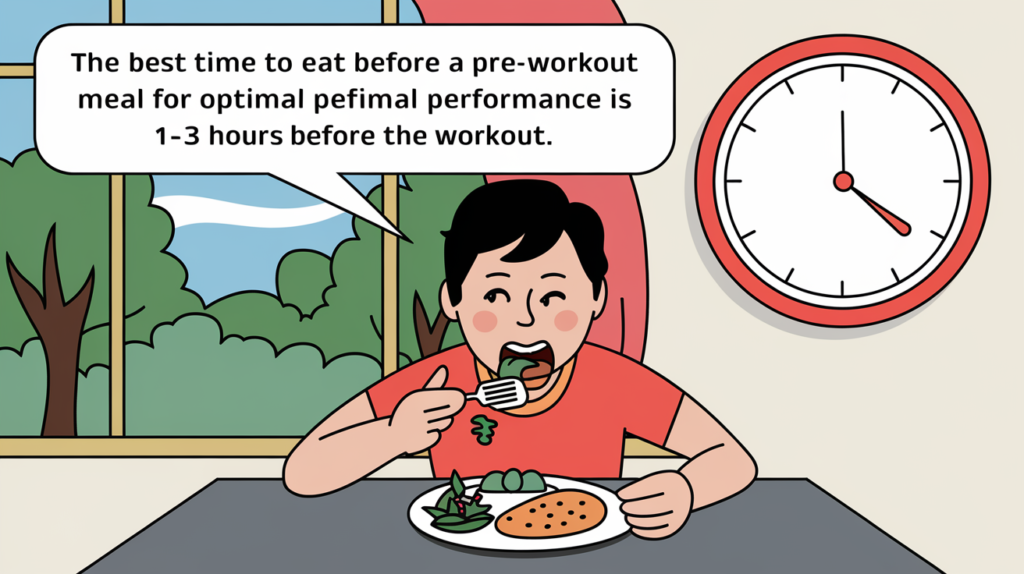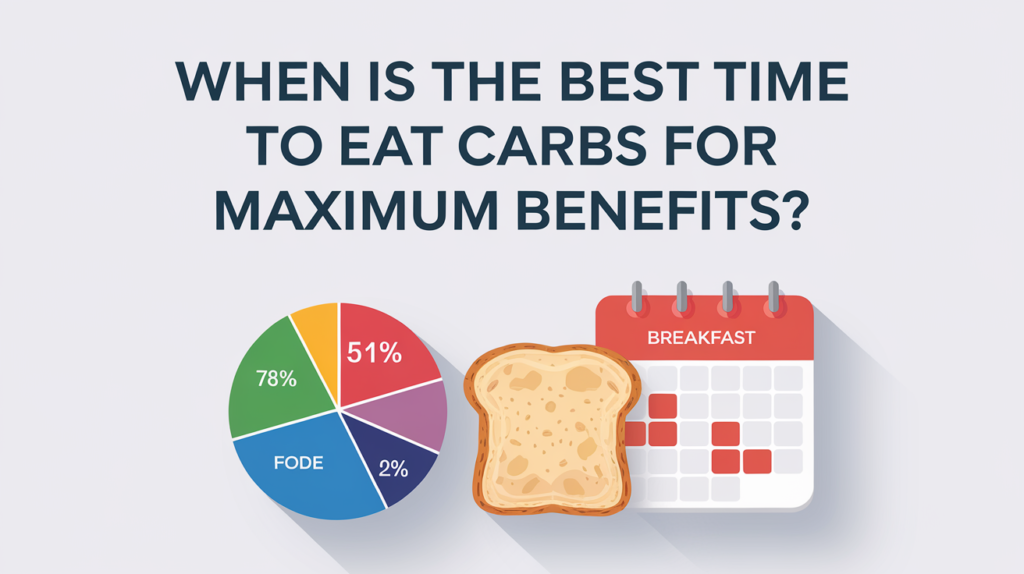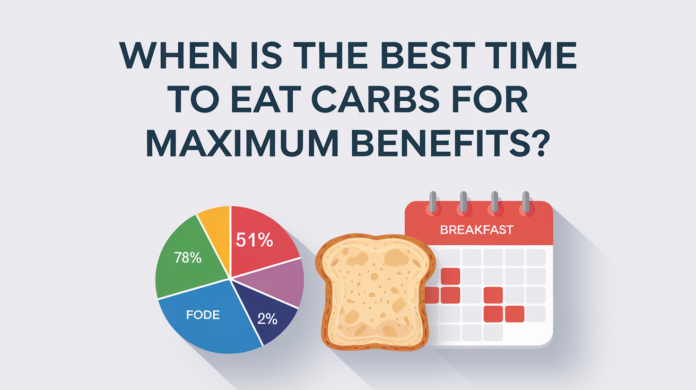Carbohydrates are a crucial part of our diet, providing the energy needed for daily activities, exercise, and overall bodily function. However, when it comes to optimizing health, performance, and even weight management, the timing of carbohydrate intake can play a significant role. Understanding the best times to eat carbs can help you maximize their benefits, whether your goal is to fuel a workout, manage blood sugar levels, or promote fat loss. In this article, we’ll explore when and how to consume carbohydrates to get the most out of your diet.
The Role of Carbohydrates in the Body

Carbohydrates are one of the three macronutrients, alongside proteins and fats. They are the body’s preferred source of energy, particularly for high-intensity activities and brain function. Carbs are broken down into glucose, which is used immediately for energy or stored in the liver and muscles as glycogen for later use.
Types of Carbohydrates:
- Simple Carbohydrates: These are quickly digested and provide a rapid source of energy. Examples include sugars found in fruits, honey, and processed foods.
- Complex Carbohydrates: These take longer to digest and provide a more sustained release of energy. Examples include whole grains, legumes, and starchy vegetables.
Best Times to Eat Carbs

The timing of carbohydrate intake can affect everything from energy levels and exercise performance to fat storage and muscle recovery. Here’s a breakdown of the best times to consume carbs for different goals:
1. Pre-Workout: Fueling Your Exercise
- Why It’s Important: Carbohydrates are the primary fuel source for high-intensity exercise. Eating carbs before a workout can help ensure you have enough energy to perform at your best, whether you’re lifting weights, running, or engaging in a high-intensity interval training (HIIT) session.
- When to Eat: Aim to eat a meal or snack containing complex carbohydrates 1-3 hours before your workout. This gives your body time to digest and convert the carbs into glycogen, which your muscles will use during exercise.
- What to Eat: Opt for foods like oatmeal, brown rice, sweet potatoes, or whole-grain bread. If you’re short on time, a piece of fruit or a small smoothie made with a banana and some oats can provide quick energy.
2. Post-Workout: Replenishing Glycogen Stores
- Why It’s Important: After exercise, your body needs to replenish the glycogen stores that were depleted during your workout. Consuming carbohydrates after a workout helps to speed up recovery, reduce muscle soreness, and prepare your body for the next exercise session.
- When to Eat: The post-workout window, typically within 30 minutes to 2 hours after exercise, is the best time to consume carbs. During this time, your muscles are particularly receptive to absorbing glucose and restoring glycogen levels.
- What to Eat: Combine fast-digesting carbs like white rice, potatoes, or a banana with a source of protein, such as a protein shake, chicken breast, or Greek yogurt, to enhance muscle recovery and glycogen replenishment.
3. Morning: Kickstarting Your Day
- Why It’s Important: Eating carbs in the morning can help kickstart your metabolism and provide the energy needed to power through your day. This is particularly important if you have a busy morning or engage in physical activity early in the day.
- When to Eat: Having a carbohydrate-rich breakfast within an hour or two of waking up can help stabilize blood sugar levels and prevent mid-morning energy crashes.
- What to Eat: Choose complex carbs like whole-grain toast, oatmeal, or a quinoa bowl paired with protein and healthy fats for a balanced breakfast that keeps you full and energized.
4. Evening: Strategic Carbohydrate Consumption
- Why It’s Important: There’s a common misconception that eating carbs at night leads to weight gain, but timing your carbs in the evening can actually have benefits, especially if you’ve been active during the day or work out in the evening. Consuming carbs at dinner can help replenish glycogen stores and promote better sleep by increasing the production of serotonin, a hormone that regulates sleep.
- When to Eat: If you prefer to eat carbs at night, focus on consuming them with dinner, particularly after an evening workout.
- What to Eat: Pair complex carbs like sweet potatoes, brown rice, or quinoa with lean protein and vegetables. The combination of carbs and protein can aid in muscle recovery and help you relax before bed.
5. Carb Cycling: Tailoring Carb Intake to Activity Levels
- Why It’s Important: Carb cycling is a strategy where you adjust your carbohydrate intake based on your activity level. On days when you’re more active or have intense workouts, you consume more carbs to fuel your performance and recovery. On rest days or lighter activity days, you reduce your carb intake to promote fat burning.
- When to Eat: On high-activity days, increase your carb intake throughout the day, particularly around your workouts. On low-activity days, focus on eating fewer carbs and more protein and healthy fats.
- What to Eat: On high-carb days, include a variety of complex carbs like oats, whole grains, and starchy vegetables in your meals. On low-carb days, focus on non-starchy vegetables, lean proteins, and healthy fats.
Carbohydrates and Weight Management

The timing of carbohydrate intake can also influence weight management. Here’s how you can strategically time your carbs to support weight loss or maintenance:
1. Eating Carbs Earlier in the Day
- Why It’s Important: Consuming the majority of your carbs earlier in the day can help you burn them off more efficiently, as you’re likely to be more active. This can prevent the excess calories from being stored as fat.
- When to Eat: Focus on eating carbs at breakfast and lunch, tapering off your intake as the day progresses. This strategy can help stabilize blood sugar levels and reduce evening cravings.
- What to Eat: Start your day with whole grains, fruits, and vegetables, and gradually shift to more protein and fat-based meals as the day goes on.
2. Managing Portion Sizes
- Why It’s Important: The amount of carbs you eat is just as important as when you eat them. Overeating carbs, regardless of timing, can lead to weight gain, especially if they’re not burned off through physical activity.
- When to Eat: Be mindful of portion sizes throughout the day, especially at meals where you’re less active. Aim to balance your carb intake with your energy needs.
- What to Eat: Use portion control tools like measuring cups or your hand to gauge appropriate serving sizes. For example, a serving of cooked grains or starchy vegetables should be about the size of your fist.
3. Consideration for Low-Carb Diets
- Why It’s Important: If you’re following a low-carb diet, the timing of your limited carb intake becomes even more critical. Eating carbs around your workouts can help optimize performance and recovery while keeping your overall intake low.
- When to Eat: For those on low-carb diets, consume most of your carbs around your workouts to maximize their benefits.
- What to Eat: Focus on nutrient-dense, low-carb foods like leafy greens, berries, and non-starchy vegetables throughout the day, saving any higher-carb foods for post-workout meals.
Special Considerations

The best time to eat carbs can vary based on individual factors such as health conditions, lifestyle, and fitness goals. Here are some additional considerations:
1. Individuals with Insulin Sensitivity
- Why It’s Important: Those with insulin sensitivity or diabetes need to be particularly mindful of carb timing and portion sizes to maintain stable blood sugar levels.
- When to Eat: Spread carb intake evenly throughout the day to avoid blood sugar spikes. Pair carbs with protein and healthy fats to slow digestion and absorption.
- What to Eat: Focus on low-glycemic index carbs like whole grains, legumes, and non-starchy vegetables.
2. Athletes and Highly Active Individuals
- Why It’s Important: Athletes and those with high activity levels may require more carbohydrates to fuel their performance and recovery.
- When to Eat: Prioritize carbs around workouts and during recovery periods. Consider using carb supplements like sports drinks or gels during prolonged exercise.
- What to Eat: Incorporate a mix of fast-digesting and slow-digesting carbs to meet your energy needs before, during, and after exercise.
3. People Following Intermittent Fasting
- Why It’s Important: For those practicing intermittent fasting, the timing of carb intake is naturally restricted to the eating window.
- When to Eat: Align your carb intake with your workouts and within your eating window to optimize performance and recovery.
- What to Eat: Choose complex carbs that provide sustained energy during your eating window, and consider timing them closer to your workouts.
Conclusion: Timing Your Carbs for Maximum Benefits
Carbohydrates are a vital part of a balanced diet, and strategically timing your carb intake can enhance energy levels, workout performance, recovery, and overall health. Whether you’re aiming to fuel a workout, manage your weight, or improve your overall well-being, understanding when to eat carbs can help you achieve your goals.
Remember, the best time to eat carbs depends on your individual lifestyle, activity level, and health goals. By paying attention to how your body responds to different carb timing strategies, you can optimize your diet for maximum benefits and make informed choices that support your long-term success.






